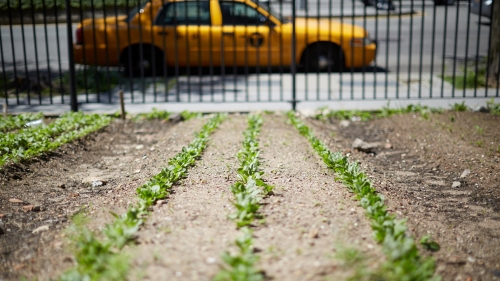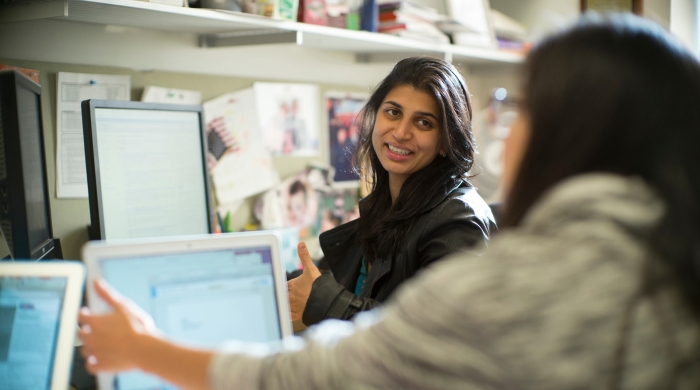Christy Spackman graduated with her PhD in Food Studies in 2015. Read on to learn more about Christy's professional background, her interest in exploring the intersections of food science and art, and her current role as an Assistant Professor at Arizona State University.
What was your professional background before coming to NYU?
I worked for five years as a laboratory technician at the University of Chicago. Our lab’s research focused on characterizing a recently discovered protein in a cell-signaling pathway often associated with cancer. I was very good at my job. But I wasn’t curious about the research I did. After a few years, I decided to attend culinary school at night. That opened up new, previously overlooked doors: it turned out there were degrees that allowed one to combine food and science! This led me to start a PhD program at the University of Illinois at Urbana-Champaign in food chemistry. Food chemistry is awesome – learning about how foods work makes it much easier to modify or develop recipes. This proved very useful for my blogging hobby (at the time I was writing a blog, Balance, pretty regularly).
What inspired you to pursue your PhD and research interests?
The research question I found most interesting was not the sorption properties of sugar gum paste (although to be honest that was pretty cool – I got to play with candy!), but rather exploring why some people were willing to pay a small fortune for Ferran Adria’s food but cataloged Kraft’s Mac n’ Cheese as inedible when both foods drew heavily on insights from food science. My advisor suggested I might be in the wrong kind of program, and a serendipitous suggestion to read Marion Nestle’s What to Eat while on a field trip to visit a massive pizza production factory opened my eyes to NYU’s Food Studies program.
What was the most influential part of your experience in the PhD program?
Jennifer Berg’s "Field Trips in Food: Immigrant New York City" course made it possible for my small-town self to fall completely in love with the city, which in turn opened the door to realizing how much a built environment can teach about food, its history, and how it is currently practiced. Frankly, the most influential part of my experience in the doctoral program were the people I got to interact with. While NYU Food Studies admitted very few doctoral students (1-3 per year) during my time there, that cohort remains the most critical part of how I became the scholar-practitioner I am today. In addition, the cohort of master's students played a similar role in shaping my thinking, exposing me to a wide range of interests, skills, and questions.
Can you tell me about the work you’re doing now?
I’m currently an assistant professor at Arizona State University with a joint appointment between the School for the Future of Innovation in Society and the School of Arts, Media, and Engineering: in other words, I work at the intersection of (food) science and art! ASU is really committed to breaking down disciplinary barriers, which makes it the perfect place for a Food Studies graduate who wants to take food science, play around with its limits, and explore what doing food science otherwise might look like. I spent a large chunk of 2019 leading the development and implementation of Emerge 2020: Eating at the Edges, an art-science festival with the aim of helping people of all ages explore what it means to eat in times of increasing precarity. We were one week from go-time when the nation realized how serious COVID-19 was, which means that year of work is on indefinite pause. I’ve only now begun to mourn that loss, but at the same time am intrigued to see how we have to re-work the festival to account for what I think of as the new era of food safety – an era still in the making. I am currently developing a new art/(food) science project called Flavor Stories, building out a portable food science lab (somewhere between a food truck and a bike), and working with some amazing graduate students and undergraduates on understanding how regulations and sensing bodies tangle together. #dreamjob
What would you consider to be the greatest accomplishment(s) of your career so far?
I’ve been collaborating with an amazing group of scholars for the past five years exploring how the work of sensing is mobilized in the food industry. We have produced a symposium and two special issues (“Accounting for Taste” in Senses and Society; “Sensory Labor” in Food, Culture, and Society) that are setting in motion a new subfield in food studies. I’m pretty proud of that work, especially because it’s been read by food studies scholars and food scientists.
After four years of writing, re-writing, and revising, I’ve published what I consider the best paper of my career so far, “In Smell's Shadow: Materials and Politics at the Edge of Perception,” in Social Studies of Science. I am committed to doing scholarship that not only critiques, it also offers a new path forward, and this paper exemplifies that – although I must also admit that it is definitely written to an academic rather than an everyday audience. The article draws on a now largely forgotten spill of an uncharacterized chemical into Charleston, West Virginia’s municipal water supply to examine how sensory science at times inadvertently reproduces harm in its efforts to produce objective facts. I propose that things like taste and smell, however, have shadows that are always following them around and that a sensory science that produces knowledge about smell’s shadows is the sort of science that will start contributing to building a better world.
Do you have any advice for folks interested in a similar career path?
Follow your nose. It will take you interesting places, and along the way, you’ll end up crafting the story that makes sense for your life.
Is there anything else you’d like to share?
The faculty in the Food Studies program created a patchwork quilt of mentorship that supported each other and their students by drawing on individual strengths.
About the PhD in Food Studies

Nutrition and Food Studies
411 Lafayette Street, 5th Floor
New York, NY 10003
Phone: 212-998-5580
Email: nutrition@nyu.edu

